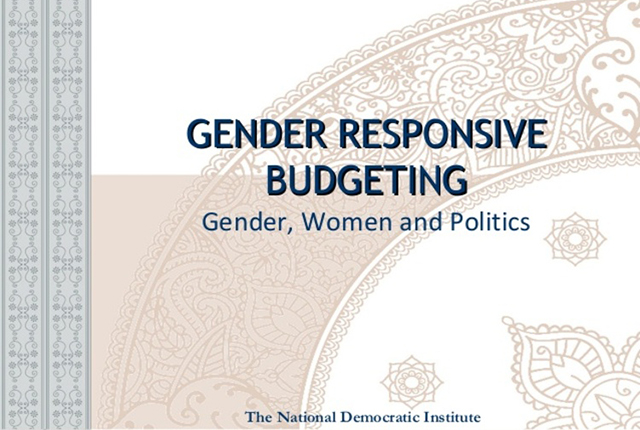Women’s participation in budget processes must be improved

 Rumbidzayi Zinyuke Syndication Writer
Rumbidzayi Zinyuke Syndication Writer
Does anyone remember an incident that took place back in 2014 when a legislator brought in an assortment of sanitary wear that included pads, tampons and cotton wool to help make her point in Parliament? MDC Proportional Representation MP Priscilla Misihairabwi-Mushonga had raised a motion calling for scrapping of duty on sanitary wear. Misihairabwi-Mushonga argued that most women and girls could not afford sanitary wear, which could cost up to $21 every month.
So emotional was the debate that several other female MPs opened up on the challenges that have been faced by women since before independence. Mutare South MP Nyasha Chikwinya said during the liberation struggle, she and other women had to crush tree bark for use as sanitary wear.
“It is painful that 34 years after independence, women cannot afford sanitary wear and have to use unhygienic means such as leaves, newspapers and tissues (toilet paper) as pads. One of these days, female MPs will boycott putting on pads to force Government to remove duty on sanitary wear,” Chikwinya said.
While theirs was not an orthodox way of raising a motion, it was the best way to galvanise Treasury into action.
During the presentation of the 2017 National budget in December last year, Finance and Economic Development Minister Patrick Chinamasa announced that importation of raw materials, which include pulp, glue and virgin tissue would become duty-free under manufacturers’ rebate from the beginning of 2017.
While it might take some time for local sanitary wear manufacturers to realise profits and effect price adjustments, it is a step in the right direction.
This is what active participation in budget processes can bring about.
For years, women and youths have not been actively participating in budget processes, at local authority or national level.
Whether they have been sidelined intentionally or they themselves have not been keen to take part in budget consultations is a subject for another day. But leaving out such a huge grouping of the country’s population from such processes cannot be good for the development of the nation.
The process that goes into developing the budget is as important as the budget itself.
The Zimbabwe Coalition on Debt and Development (Zincodd) under its project Women Engagement in Economic Governance (WEEG) has been raising awareness on such issues urging women to participate in local council and national budget processes.
Zimcodd has been advocating participatory budgeting to facilitate the involvement of women and girls in budgeting processes.
Addressing delegates during one such meeting in Chitungwiza recently, Zimcodd communications coordinator Grace Mugebe said women needed to be vocal and state how they want to be included in budget allocations, be it in municipal budgets or the national budget.
“Let us not take our voice for granted. Some of our concerns are heard and they can be addressed,” she said.
She said excise duty on beer had been reduced twice before Government implemented the same measure for sanitary wear. And this only happened after women began active lobbying for the removal of tax on sanitary wear.
Participants at the Zimcodd meeting noted with concern how women have been sidelined in governance and budget issues despite being the most affected group by some of the decisions that are made in their absence.
Emilda Mabidori, a member of the Chitungwiza Residents and Ratepayers Association (CHIRRA) said Zimbabwean women need to be more active in developmental issues.
“As women, we need to take a more active role in budget processes so that issues that affect us can be resolved not just pushed to the side. Some of our councillors are letting us down; they do not take our concerns to budget consultative meetings so at the end of the day we find that very few issues to do with women make it into the council budget. We need to represent ourselves for us to be heard,” she said.
Sheryl Chigwedere said youths in their communities have been labelled useless and are not listened to even if they have good ideas that can develop the community.
“For years, youth participation in budget issues has been very low. We have been tagged as young people with nothing to do, but we would like to take part in such important issues and be part of the decision making process. If our input is not taken into consideration, it makes it difficult for youths to be good leaders in the future,” she said.
The low levels of engagement on budget processes has also been significantly felt in the rural areas where some women did not even know that they could participate in such processes.
Ms Sibongile Mataya of Goromonzi said women have in the past been told what had been decided when council came up with its budget without any of their input being solicited.
“Now we know that if we take part in these processes, we know how our money, which is collected from taxes, will work and how much will be used for projects that involve us as women,” she added. — Zimpapers Syndication Services.
Village head Kufandada Musonza said women need to unite and voice their concern as a unit and avoid individual contributions.
“Women’s voices have not been heard because they have been trying to do things individually. If you do it alone it doesn’t work. But now that they are doing it in groups, their voices are bound to be heard,” he said.
One of the best ways to achieve such success would be for women to participate during budget consultative meetings which are held every year before the final council or national budgets are drawn up.
Experts say budget hearings are one of the most direct channels by which the electorate can influence tangible local politics.
The foundation of participatory budgeting is that local government budgeting should not be treated as a piecemeal initiative, whereby residents are involved at a later stage — but from the initial stages of the process.
Unfortunately, this is what has been happening in most council budgets across the country. Residents are only involved at a much later stage and most of their concerns are not included in the final budget.
A study by the Bulawayo Progressive Residents Association (BPRA) released last year showed that there was minimum citizen participation in the budgeting process by the Bulawayo City Council.
The study, “A Social Surgery of the Budget Making Process at Local Government Level: Bulawayo City Council in Perspective,” showed that citizens were not involved in the stages of budget preparation, budget implementation, monitoring and evaluation.
“Many of the important stakeholders in budgeting, such as civil society, residents, central government and councillors, were not adequately performing their roles in the budget process,” read part of the study.
But with more awareness campaigns aimed at educating women on the possibility of contributing to the whole budget process, Zimbabwean women can begin to see more policy measures that work in their favour being included in council and national budgets. — Zimpapers Syndication Services.










Comments